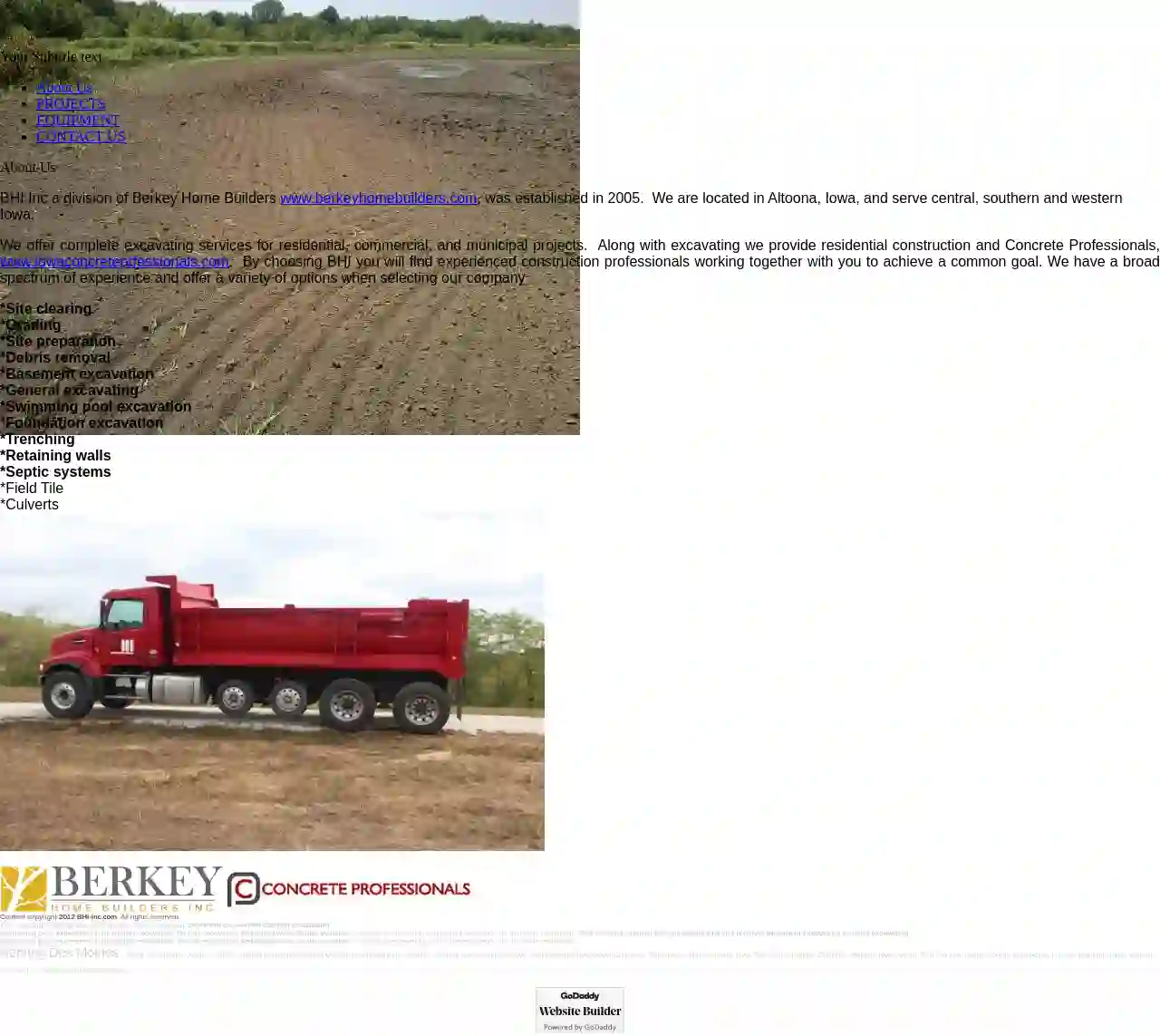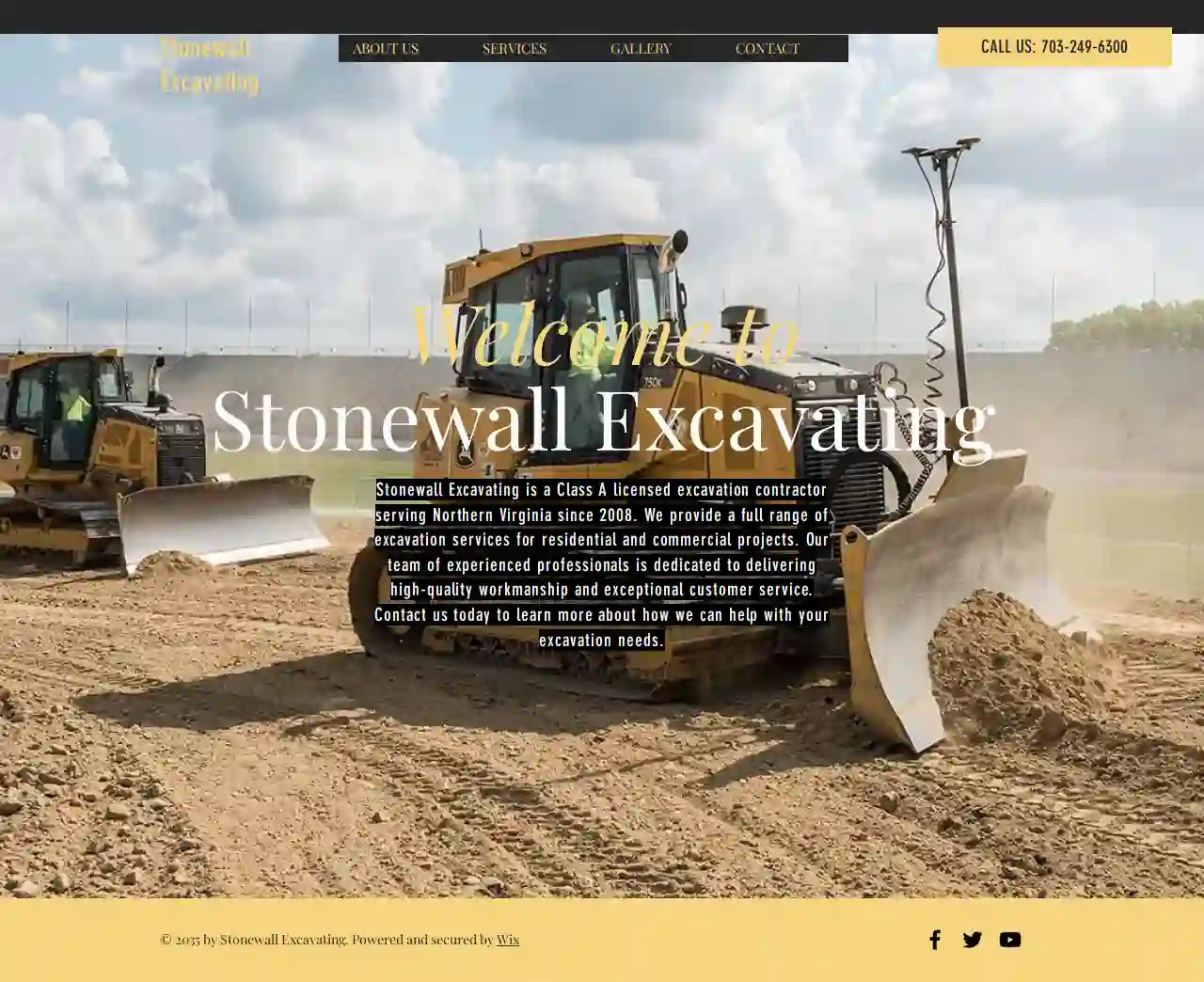Excavation Contractors Iowa City
Best Excavating Contractor in Iowa City
Receive 3 FREE Excavation Contractors quotes for your project today! Compare profiles, reviews, accreditations, portfolio, etc... and choose the best deal.

BHI-Inc
1Des Moines, USAbout BHI Inc. BHI Inc, a division of Berkey Home Builders ( www.berkeyhomebuilders.com ), was established in 2005. We are located in Altoona, Iowa, and serve central, southern, and western Iowa. We offer complete excavating services for residential, commercial, and municipal projects. Along with excavating, we provide residential construction and Concrete Professionals ( www.iowaconcreteprfessionals.com ). By choosing BHI, you will find experienced construction professionals working together with you to achieve a common goal. We have a broad spectrum of experience and offer a variety of options when selecting our company.
- Services
- Why Us?
- Gallery
Get Quote
Rock Hard Excavating
538 reviews1800 Valley Wood Rd, McLean, VA, USRock Hard Excavating: Your Trusted Partner for Site Work in Northern Virginia Rock Hard Excavating is a family-owned and operated business with over 45 years of experience serving Northern Virginia. We are a second-generation company dedicated to providing high-quality demolition, excavation, and site utility services to both residential and commercial clients. Our commitment to excellence, combined with our experienced team, ensures that every project is completed on time and within budget. We understand the unique challenges of working in Northern Virginia, and we have the expertise and equipment to handle any project, big or small. From site preparation and clearing to stormwater management and underground utilities, we offer a comprehensive range of services to meet your needs. At Rock Hard Excavating, we pride ourselves on our customer-centric approach. We work closely with our clients to understand their specific requirements and ensure their complete satisfaction. Our team is always available to answer your questions and provide expert advice throughout the project.
- Services
- Why Us?
- Testimonials
- Gallery
Get Quote
Precision-Dirt-Work
4.312 reviewsWillis, 77318, USPrecision Dirt Work is a reliable contractor for Harris and Montgomery County, Texas. We offer a variety of earthwork and earth moving services to commercial and residential customers. Our skilled operators can resolve leveling, grading, and drainage problems. We provide complete bush hogging, lot clearing, and final grade leveling services. Precision can design and lay rock, gravel, and crushed concrete driveways with culverts installed as needed. We also assist with fencing projects by digging post holes and can do the entire job quickly, efficiently, and cost-effectively. Our team will take care of your mowing year-round, and you can set the schedule and forget about it. We offer all types of tractor work and services, including landscape design and construction, stump grinding, grounds leveling, sod installation, new home clean-up, irrigation excavation, long-term contract maintenance mowing, acreage mowing, tractor grading, pad site preparation, and culvert installation or replacement.
- Services
- Why Us?
- Accreditations
- Our Team
- Gallery
Get Quote
Stonewall Excavating
1Ames, USWelcome to Stonewall Excavating Stonewall Excavating is a Class A licensed excavation contractor serving Northern Virginia since 2008. We provide a full range of excavation services for residential and commercial projects. Our team of experienced professionals is dedicated to delivering high-quality workmanship and exceptional customer service. Contact us today to learn more about how we can help with your excavation needs.
- Services
- Why Us?
- Gallery
Get Quote
HODGE Land Solutions LLC.
53 reviews7440 FM 39 South, North Zulch, 77872, USHODGE Land Solutions LLC has the expertise and equipment for all dirt work and land projects. Our fleet of brand new equipment on warranty with a stringent preventative maintenance schedule. Services and repairs are done at the dealer for proper record keeping to ensure certified technicians are working on our equipment. Therefore, reducing down time and delays to our respected customers. Machines are integrated with todays most advanced industry technology. This allows for highest performance and the most production. Our customers feel the savings while benefiting from efficiency and quality work. There is no comparison from a brand new machine to a tired old one in todays world. With modern equipment it has allowed us to hold a strong safety track record. For your protection and for ours, Hodge LLC. is fully insured holding a general liability policy.
- Services
- Why Us?
- Gallery
Get Quote- H&
H&H Tile, Dozing and Excavating
1123 Main Street, City, 12345, USAbout HH Tiling, Dozing & Excavating HH Tiling, Dozing & Excavating is a locally owned and operated business with a commitment to providing high-quality construction services to the [CITY] area. We specialize in tiling, dozing, and excavating, offering a wide range of services to meet your needs. Our team of experienced professionals is dedicated to delivering exceptional results, on time and within budget. We take pride in our workmanship and our commitment to customer satisfaction. We believe in building strong relationships with our clients, and we strive to exceed their expectations on every project. Whether you're looking to renovate your bathroom, build a new driveway, or excavate for a foundation, HH Tiling, Dozing & Excavating is the team you can trust.
- Services
- Why Us?
- Gallery
Get Quote - Bi
Big Hoe Excavation LLC
1Des Moines, US- Services
- Why Us?
Get Quote - Ut
Utz Excavation, LLC
1Ames, US- Services
- Why Us?
Get Quote - We
Web Excavating Llc
1Ames, US- Services
- Why Us?
Get Quote - Ba
Baker Concrete And Excavating
3.99 reviewsDes Moines, US- Services
- Why Us?
Get Quote
Over 21,512+ Excavation Businesses in our network
Our excavation contractors operate in Iowa City and beyond!
ExcavationHQ has curated and vetted Top Excavation Businesses in and around Iowa City. Find a trustworthy contractor today.
Frequently Asked Questions About Excavation Contractors
- Spring and Fall: Often considered favorable due to moderate temperatures and drier soil conditions.
- Summer: Can be suitable, but hot weather can make working conditions challenging and might require additional measures (shade, hydration) for workers.
- Winter: Excavation in winter can be more difficult due to frozen ground, snow, and potential delays caused by inclement weather. It might also require specialized equipment or techniques.
- Soil Type and Stability: Stable, cohesive soils allow for deeper excavations than loose or unstable soils.
- Groundwater Level: Excavations below the water table require dewatering techniques to manage water intrusion.
- Equipment and Resources: The size and capabilities of excavation equipment influence the achievable depth.
- Safety Regulations: OSHA and other safety regulations impose limitations on trench depths without proper shoring or sloping.
- Project Requirements: The purpose of the excavation (basement, pool, foundation) determines the necessary depth.
- Trench Collapses: Unstable trench walls can cave in, posing a severe risk to workers. Proper shoring and sloping are crucial safety measures.
- Utility Damage: Striking underground utilities (gas, water, electric) can cause leaks, explosions, or electrocution. Accurate utility locates and careful digging are essential.
- Falling Objects: Materials or equipment falling into excavations can injure workers. Securing work areas and using appropriate safety gear is vital.
- Equipment Accidents: Operating heavy machinery involves risks of rollovers, collisions, or mechanical failures. Trained operators and proper equipment maintenance are critical.
- Environmental Hazards: Excavated soil might contain hazardous materials (asbestos, lead). Proper testing and disposal procedures are necessary.
- Hauling to Designated Disposal Sites: Transporting excavated material to approved landfills or recycling centers.
- Recycling or Reuse: If suitable, some excavated soil might be recycled for other projects or reused on-site for landscaping or backfilling.
- Complying with Regulations: Adhering to local and environmental regulations for soil disposal to prevent contamination or illegal dumping.
What is the best time of year for excavation?
How deep can you excavate?
What are the risks associated with excavation?
How do you handle soil disposal after excavation?
What is the best time of year for excavation?
- Spring and Fall: Often considered favorable due to moderate temperatures and drier soil conditions.
- Summer: Can be suitable, but hot weather can make working conditions challenging and might require additional measures (shade, hydration) for workers.
- Winter: Excavation in winter can be more difficult due to frozen ground, snow, and potential delays caused by inclement weather. It might also require specialized equipment or techniques.
How deep can you excavate?
- Soil Type and Stability: Stable, cohesive soils allow for deeper excavations than loose or unstable soils.
- Groundwater Level: Excavations below the water table require dewatering techniques to manage water intrusion.
- Equipment and Resources: The size and capabilities of excavation equipment influence the achievable depth.
- Safety Regulations: OSHA and other safety regulations impose limitations on trench depths without proper shoring or sloping.
- Project Requirements: The purpose of the excavation (basement, pool, foundation) determines the necessary depth.
What are the risks associated with excavation?
- Trench Collapses: Unstable trench walls can cave in, posing a severe risk to workers. Proper shoring and sloping are crucial safety measures.
- Utility Damage: Striking underground utilities (gas, water, electric) can cause leaks, explosions, or electrocution. Accurate utility locates and careful digging are essential.
- Falling Objects: Materials or equipment falling into excavations can injure workers. Securing work areas and using appropriate safety gear is vital.
- Equipment Accidents: Operating heavy machinery involves risks of rollovers, collisions, or mechanical failures. Trained operators and proper equipment maintenance are critical.
- Environmental Hazards: Excavated soil might contain hazardous materials (asbestos, lead). Proper testing and disposal procedures are necessary.
How do you handle soil disposal after excavation?
- Hauling to Designated Disposal Sites: Transporting excavated material to approved landfills or recycling centers.
- Recycling or Reuse: If suitable, some excavated soil might be recycled for other projects or reused on-site for landscaping or backfilling.
- Complying with Regulations: Adhering to local and environmental regulations for soil disposal to prevent contamination or illegal dumping.